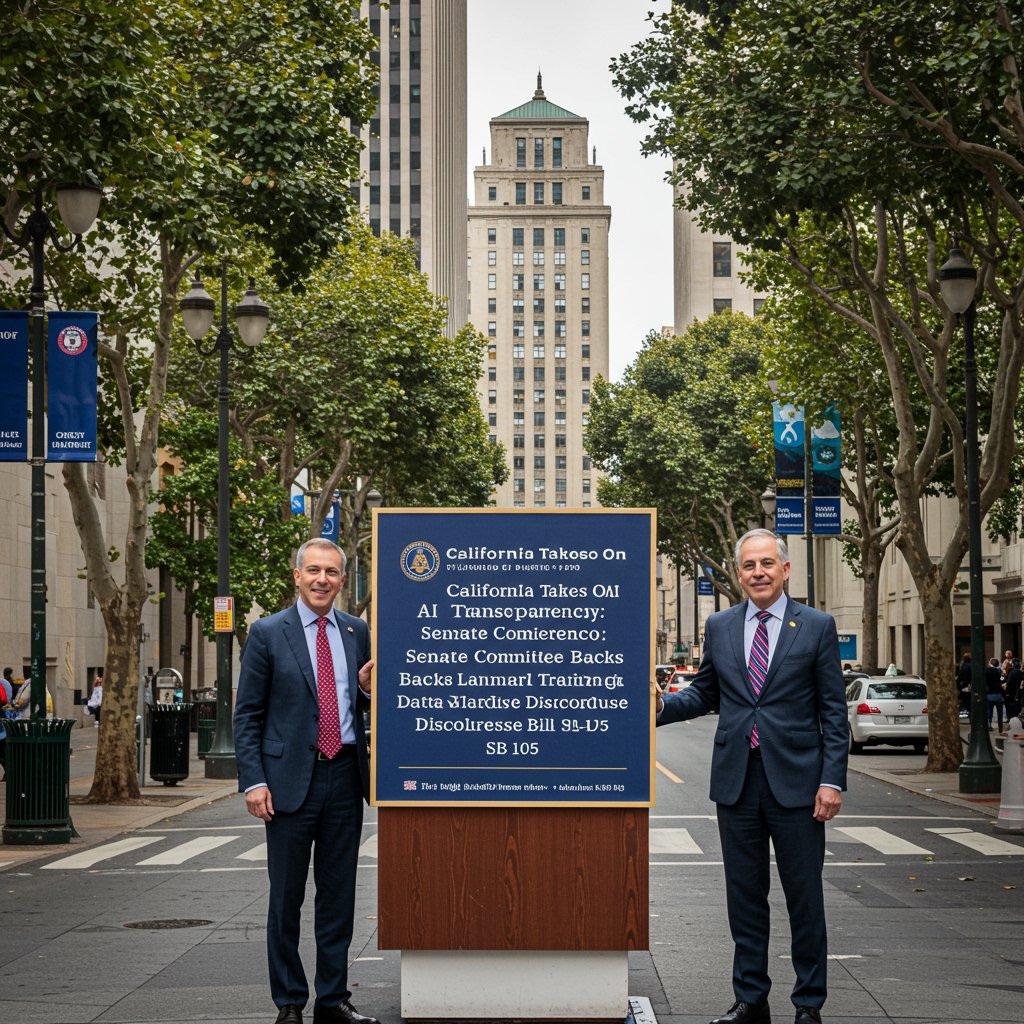California Senate Committee Advances Landmark AI Transparency Bill
Sacramento, California – In a significant legislative development aimed at shedding light on the complex and often opaque process behind artificial intelligence development, the California Senate Judiciary Committee on February 4, 2025, approved SB 105. This landmark bill, introduced by Senator Lena Gonzalez, seeks to mandate unprecedented transparency from developers of large-scale AI models regarding the data used in their training.
At its core, SB 105 requires that developers disclose the specific data sources utilized to train AI models that exceed a threshold of 100 billion parameters. This parameter count is significant, targeting the most advanced and powerful AI systems currently in development or deployment – the very models capable of generating human-quality text, realistic images, and engaging in complex reasoning. The bill’s proponents argue that such disclosure is essential for a variety of critical reasons, ranging from protecting intellectual property rights in the digital age to mitigating societal harms like algorithmic bias and the proliferation of deepfakes.
Arguments for Mandated Disclosure
Advocates for SB 105 contend that transparency around training data is not merely a technical compliance issue but a fundamental necessity for public trust, accountability, and the responsible evolution of artificial intelligence. One primary argument centers on intellectual property rights. As AI models are often trained on vast datasets scraped from the internet, licensed content, and other diverse sources, questions frequently arise about whether copyrighted material, personal data, or proprietary information is used without proper attribution or permission. Mandating disclosure would allow content creators, data owners, and individuals to potentially verify if their work or information was incorporated into the training datasets, providing a crucial first step in addressing potential infringement claims and establishing fairer practices for compensating creators whose work contributes to the capabilities of these powerful models.
Furthermore, proponents emphasize the bill’s role in helping to identify and mitigate algorithmic bias. AI systems learn from the data they are fed. If that data reflects existing societal prejudices – whether related to race, gender, socioeconomic status, or other factors – the AI model will likely perpetuate or even amplify those biases in its outputs, leading to discriminatory outcomes in areas like hiring, lending, criminal justice, or access to services. By making training data sources known, researchers, regulators, and the public can scrutinize the origins of potential biases within a model, paving the way for the development of less discriminatory AI systems and fostering greater equity in algorithmic decision-making.
A third compelling argument for SB 105, particularly relevant in the era of sophisticated generative AI, is its potential to aid in combating the spread of deepfakes and other forms of synthetic media manipulation. Advanced AI models trained on massive datasets of images, audio, and video can create highly convincing fake content. While the bill doesn’t directly prevent the creation of deepfakes, transparency about the training data could provide insights into how these models acquire their generative capabilities. Understanding the data sources might assist researchers in developing more effective detection methods for synthetic content or help trace the potential origin points of harmful or misleading generated media, contributing to broader efforts to maintain information integrity.
Concerns Raised by Tech Industry Opponents
The push for transparency, however, is met with significant concerns from major technology firms, many of whom have substantial operations within California and are at the forefront of developing these large AI models. Companies including Google, Meta, and OpenAI have voiced strong opposition to SB 105, primarily citing potential burdens on innovation and the immense technical complexities involved in meeting the proposed disclosure requirements.
These firms argue that mandating detailed disclosure of training data sources could place a substantial burden on innovation. The process of curating, cleaning, and utilizing vast datasets for AI training is highly complex and represents a significant investment of resources and intellectual effort. Revealing these sources, they contend, could reveal proprietary methodologies or ‘secret sauce’ that give them a competitive edge, potentially hindering their ability to innovate rapidly and compete globally. They suggest that the compliance costs and potential legal entanglements associated with detailed disclosure could divert resources away from crucial research and development efforts, potentially slowing down the pace of AI advancement.
A major point of contention raised by the industry is the sheer technical complexities of tracing diverse data inputs. AI training datasets are rarely static or easily categorized. They often involve intricate combinations of publicly available web data (scraped from billions of pages), licensed datasets from various providers, proprietary internal data, and even synthetic data generated by other models. Tracing and documenting every single piece of source data for a model trained on, potentially, trillions of data points is described as an extraordinarily difficult, if not practically impossible, task. Opponents argue that the requirements of SB 105 may exceed the current technical capabilities of even the most advanced AI labs, making full compliance extremely challenging and costly.
Furthermore, tech companies express concerns about the potential for such detailed data disclosures to pose competitive risks. Training data and the specific ways it is processed are often considered valuable trade secrets. Mandated public or semi-public disclosure could allow competitors to gain insights into a company’s AI capabilities and development strategies without having made similar investments, potentially undermining the competitive landscape in the rapidly evolving AI sector.
Legislative Path Forward
The approval of SB 105 by the Senate Judiciary Committee on February 4, 2025, marks a critical step forward for the legislation. The committee’s decision indicates sufficient support at this stage to move the bill through the initial legislative hurdles. The bill will now proceed to the full Senate floor for further debate and consideration. The process ahead will involve rigorous discussion, potential amendments, and significant lobbying efforts from both proponents and opponents as the bill navigates through the rest of the legislative process in California.
If ultimately passed into law, SB 105 could have implications reaching far beyond the Golden State. As one of the first significant attempts in the United States to regulate AI transparency at this level, the bill has the potential to set a precedent for how AI models are governed across the country. Other states and potentially the federal government are closely watching California’s legislative actions in the AI space. A successful implementation of SB 105 could provide a model for future national or even international regulations concerning AI training data transparency, influencing the direction of AI development and governance for years to come.
The debate surrounding SB 105 highlights the fundamental tension between the push for greater transparency and accountability in advanced AI systems and the industry’s concerns about stifling innovation and technical feasibility. As the bill moves through the California legislature, its outcome will be closely watched as a key indicator of the future regulatory landscape for artificial intelligence.


















